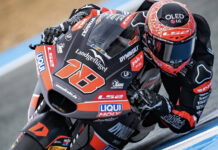MILWAUKEE — Harley-Davidson, Inc. (“Harley-Davidson”) (NYSE:HOG) today announced actions it has taken to rewire the company, setting the foundation for a 5-year plan as the most desirable motorcycle brand in the world. The company also reported second quarter 2020 financial results, and its ongoing actions to manage the impacts of COVID-19 on its business.
“I’m very pleased with our accomplishments in these times of extraordinary challenges and uncertainty. Through all of this, we have made significant progress toward the goals of The Rewire; the positive feedback from key stakeholders and the early impacts we are seeing in the marketplace are very encouraging,” said Jochen Zeitz, chairman, president and CEO, Harley-Davidson. “A total rewire is necessary to make Harley-Davidson a high-performance company. Building on our strong brand legacy, we are reinvigorating our core profit driving business – powered by our strongest dealers, most exciting products and careful inventory management, while focusing on the most important opportunities for future expansion. We’re overhauling our operating model and our product plan and are rewiring our market structure and organization to focus on the strengths of our brand and company. We are now working on our new 5-year strategic plan, The Hardwire, which will be grounded in enhancing the desirability of our brand and protecting the value of our iconic products.”
New Operating Model: Reduced Complexity and Increased Speed
Vast changes to the company’s operating model under The Rewire include all areas of the business globally, from commercial operations to center-led support functions. Significant work has been undertaken to eliminate duplication, inefficiencies and complexity throughout the organization. As previously announced, the streamlined structure requires 700 fewer positions across its global operations.
Refined Motorcycle Line-Up and High-Impact Product Launches
The company plans to rewire its product offering to more precisely match customer desires and to strengthen the value of its products. The company will also improve product timing and go-to-market plans to achieve the greatest market impact.
Highlights of the new approach include:
- Streamlining planned motorcycle models by approximately 30 percent; balancing investments between current stronghold categories and new, high-potential segments
- Expanding product offerings of its best-selling, iconic motorcycles
- Delivering its first Adventure Touring motorcycle – Pan America 1250 – in 2021
- Shifting annual product launch timing from August to early in the first quarter
- Reinvigorating launch efforts including collaborations with key influencers to bring the brand and new products to life drive brand desirability
Among other plans, the company is set to launch a new marketing campaign including a collaboration with Jason Momoa to celebrate the shared journey and unrelenting spirit of Harley-Davidson.
Growth through Parts & Accessories and General Merchandise
The company is intensifying focus on its Parts & Accessories and General Merchandise businesses, encouraging customers to customize their entire riding experience to match their own style. Now part of the new Commercial function, new leadership has designed strategies for each business aligned to the company’s motorcycle and market priorities with the goal of delivering a holistic experience in the marketplace.
Reset Global Business and Focus on High-Potential Markets
Harley-Davidson plans to concentrate on approximately 50 markets primarily in North America, Europe and parts of Asia Pacific that represent the vast majority of the company’s volume and growth potential. The company is evaluating plans to exit international markets where volumes and profitability do not support continued investment in line with the future strategy.
The company also plans to shift resources and marketing investments into the regions for maximum impact. As part of this effort, the company has streamlined regional offices and created new groups of high potential countries that will have the autonomy, within a clearly defined framework, to drive the business. Additionally, the company plans to optimize its dealer network to provide an improved and integrated customer experience.
Protecting Value
Harley-Davidson has revamped its approach to supply and inventory management focusing on products and initiatives that add value, while significantly reducing discounting and price promotions. This is expected to drive retail pricing to help preserve the value and desirability of Harley-Davidson motorcycles for its customers and brand.
The Rewire
All of the above efforts of The Rewire aim to provide a better starting point for the future and to build desirability for the Harley-Davidson brand and products.
The Rewire outcomes and other highlights at the end of Q2:
- $250 million in cash savings (excluding restructuring charges) including SG&A and capital reductions expected in 2020
- Restructuring charges of $42 million expected to result in approximately $100 million in ongoing annual savings based upon actions taken
- Global dealer inventory down 32 percent
- On average, U.S. new Model Year 2020 motorcycles selling at MSRP
- Used Harley-Davidson pricing up significantly at retail and auction
The Rewire is expected to continue through the end of the year, leading to a first look at the company’s 2021-2025 strategic plan, The Hardwire, expected in the fourth quarter. Building on the foundation and principles of The Rewire, the driver of the new plan will be Harley-Davidson as the most desirable motorcycle brand in the world for its customers, employees, community and investors.
COVID-19 Response and Recovery
The company continues to proactively manage its business through the pandemic and has implemented robust protocols to keep workers safe in its factories. Most non-production workers will continue to work from home until the end of the year. Its response and recovery plans include supporting global dealers and customers. At the end of the quarter, about 93 percent of its global dealers were open for retail motorcycle sales following pandemic interruptions.
Included in the company’s broad cost and cash savings measures are SG&A reductions, curtailed capital spending, suspended discretionary share repurchases and a prudent approach to dividend payments. The company announced it will pay a third quarter cash dividend of $0.02 per share, in line with its second quarter dividend. The dividend is payable September 25, 2020 to the shareholders of record of the company’s common stock as of September 10, 2020.
The company has also further strengthened its strong liquidity position with nearly $4.7 billion in liquidity at the end of the quarter.
Second Quarter 2020 Results
Harley-Davidson, Inc Consolidated Financial Results
Second quarter 2020 results reflect the impacts of COVID-19 and also the actions taken in the second quarter to rewire the company. Q2 GAAP diluted EPS was $(0.60) versus $1.23 in Q2 2019. Excluding restructuring plan costs and the impact of recent tariffs, adjusted Q2 diluted EPS was $(0.35) versus $1.46 in Q2 2019. Second quarter net loss was $92 million on consolidated revenue of $865 million versus net income of $196 million on consolidated revenue of $1.6 billion in Q2 2019.
Harley-Davidson Retail Motorcycle Sales
Global retail motorcycle sales in the second quarter of 2020 were significantly impacted by COVID-19. U.S. retail sales finished down 27 percent compared to prior year.
Motorcycles and Related Products Segment Results
Revenue from the Motorcycles and Related Products segment was down in the second quarter of 2020 compared to prior year primarily driven by the temporary motorcycle manufacturing suspension during most of the quarter related to COVID-19. Gross margin and operating margin were down during the quarter primarily due to lower productivity and absorption resulting from the suspension of manufacturing.
Financial Services Segment Results
Financial Services segment second quarter operating income of $5 million was down 94 percent driven by an increase in the provision for loan losses related to COVID-19’s impact on economic projections.
Other Results
Cash – Cash and cash equivalents were $3.9 billion at the end of second quarter of 2020, compared to $925 million at the end of Q2 2019. Harley-Davidson generated $610 million of cash from operating activities year-to-date 2020 compared to $496 million year-to-date 2019.
Tax Rate – Harley-Davidson’s year-to-date effective tax rate was 3.7 percent compared to 24.1 percent in Q2 2019.
Dividend & Share Repurchase – The company paid a cash dividend of $0.02 per share for the second quarter of 2020. The company did not repurchase shares on a discretionary basis during the second quarter of 2020. During the quarter, there were 153 million weighted-average diluted common shares outstanding and 18 million shares remained on board-approved share repurchase authorizations.
2020 Outlook
Given the uncertainty that remains surrounding the impact and duration of the COVID-19 pandemic, the company is not providing financial guidance.
Company Background
Harley-Davidson, Inc. is the parent company of Harley-Davidson Motor Company and Harley-Davidson Financial Services. Our vision: Building our legend and leading our industry through innovation, evolution and emotion. Our mission: More than building machines, we stand for the timeless pursuit of adventure. Freedom for the soul. Since 1903, Harley-Davidson has defined motorcycle culture with an expanding range of leading-edge, distinctive and customizable motorcycles in addition to riding experiences and exceptional motorcycle accessories, riding gear and apparel. Harley-Davidson Financial Services provides financing, insurance and other programs to help get Harley-Davidson riders on the road. Learn more at www.harley-davidson.com.
Webcast Presentation
Harley-Davidson will discuss financial results, developments in the business, and a summary of The Rewire efforts on an audio webcast at 8:00 a.m. CT today. The webcast login and supporting slides can be accessed at http://investor.harley-davidson.com/news-and-events/events-and-presentations. The audio replay will be available by approximately 10:00 a.m. CT.
Non-GAAP Disclosure
This press release includes financial measures that have not been calculated in accordance with U.S. generally accepted accounting principles (GAAP) and are therefore referred to as non-GAAP financial measures. The non-GAAP measures described below are intended to be considered by users as supplemental information to the equivalent GAAP measures, to aid investors in better understanding the company’s financial results. The company believes that these non-GAAP measures provide useful perspective on underlying business results and trends, and a means to assess period-over-period results. These non-GAAP measures should not be considered as a substitute for, or superior to, measures of financial performance prepared in accordance with GAAP. These non-GAAP measures may not be the same as similarly titled measures used by other companies due to possible differences in method and in items or events being adjusted.
The non-GAAP measures included in this press release are adjusted net income and adjusted diluted EPS excluding restructuring plan costs and the impact of recent EU and China tariffs. Restructuring plan costs include restructuring expenses as presented in the consolidated statements of income and costs associated with temporary inefficiencies incurred in connection with the manufacturing optimization initiative included in Motorcycles and Related Products cost of goods sold. The impact of recent EU and China tariffs includes incremental European Union and China tariffs imposed beginning in 2018 on the company’s products shipped from the U.S., as well as incremental U.S. tariffs imposed beginning in 2018 on certain items imported from China. The impact of recent EU and China tariffs excludes higher metals cost resulting from the U.S. steel and aluminum tariffs. These adjustments are consistent with the approach used for 2018 to determine performance relative to financial objectives under the company’s incentive compensation plans. These non-GAAP measures, as well as a reconciliation of the comparable GAAP measure to these non-GAAP measures are included later in this press release.
Cautionary Note Regarding Forward-Looking Statements
The company intends that certain matters discussed in this press release are “forward-looking statements” intended to qualify for the safe harbor from liability established by the Private Securities Litigation Reform Act of 1995. These forward-looking statements can generally be identified as such because the context of the statement will include words such as the company “believes,” “anticipates,” “expects,” “plans,” “may,” “will,” “estimates,” “is on-track” or words of similar meaning. Similarly, statements that describe or refer to future expectations, future plans, strategies, objectives, outlooks, targets, guidance, commitments, or goals are also forward-looking statements. Such forward-looking statements are subject to certain risks and uncertainties that could cause actual results to differ materially, unfavorably or favorably, from those anticipated as of the date of this press release. Certain of such risks and uncertainties are described below. Shareholders, potential investors, and other readers are urged to consider these factors in evaluating the forward-looking statements and are cautioned not to place undue reliance on such forward-looking statements. The forward-looking statements included in this press release are only made as of the date of this press release, and the company disclaims any obligation to publicly update such forward-looking statements to reflect subsequent events or circumstances.
Important factors that could affect future results and cause those results to differ materially from those expressed in the forward-looking statements include, among others, the following: (i) the COVID-19 pandemic including the length and severity of the pandemic across the globe and the pace of recovery following the pandemic; (ii) adverse economic, political or market conditions in the U.S. and international markets and other factors such as natural disasters; and (iii) the Company’s ability to: (A) create and execute its business plans and strategies, and strengthen its existing business while allowing for desirable growth; (B) manage and predict the impact that new or adjusted tariffs may have on the company’s ability to sell products internationally, and the cost of raw materials and components; (C) successfully carry out its global manufacturing and assembly operations; (D) accurately analyze, predict and react to changing market conditions and successfully adjust to shifting global consumer needs and interests, including successfully implementing and executing plans to exit international markets where volumes and profitability do not support continued investment in line with the future strategy; (E) successfully access the capital and/or credit markets on terms that are acceptable to the company and within its expectations; (F) develop and maintain a productive relationship with Zhejiang Qianjiang Motorcycle Co., Ltd. and launch related products in a timely manner; (G) develop and introduce products, services and experiences on a timely basis that the market accepts, that enable the company to generate desired sales levels and that provide the desired financial returns; (H) perform in a manner that enables the company to benefit from market opportunities while competing against existing and new competitors; (I) realize expectations concerning market demand for electric models, which will depend in part on the building of necessary infrastructure; (J) prevent, detect, and remediate any issues with its motorcycles or any issues associated with the manufacturing processes to avoid delays in new model launches, recall campaigns, regulatory agency investigations, increased warranty costs or litigation and adverse effects on its reputation and brand strength, and carry out any product programs or recalls within expected costs and timing; (K) manage supply chain issues, including quality issues and any unexpected interruptions or price increases caused by raw material shortages or natural disasters; (L) manage the impact that prices for and supply of used motorcycles may have on its business, including on retail sales of new motorcycles; (M) successfully manage and reduce costs throughout the business; (N) balance production volumes for its new motorcycles with consumer demand; (O) manage risks that arise through expanding international manufacturing, operations and sales; (P) manage through changes in general economic and business conditions, including changing capital, credit and retail markets, and the changing political environment; (Q) successfully determine, implement on a timely basis, and maintain a manner in which to sell motorcycles in the European Union, China, and the company’s ASEAN countries that does not subject its motorcycles to incremental tariffs; (R) accurately estimate and adjust to fluctuations in foreign currency exchange rates, interest rates and commodity prices; (S) continue to develop the capabilities of its distributors and dealers, effectively implement changes relating to its dealers and distribution methods and manage the risks that its independent dealers may have difficulty obtaining capital and managing through changing economic conditions and consumer demand; (T) retain and attract talented employees, and eliminate personnel duplication, inefficiencies and complexity throughout the organization; (U) prevent a cybersecurity breach involving consumer, employee, dealer, supplier, or company data and respond to evolving regulatory requirements regarding data security; (V) manage the credit quality, the loan servicing and collection activities, and the recovery rates of HDFS’ loan portfolio; (W) adjust to tax reform, healthcare inflation and reform and pension reform, and successfully estimate the impact of any such reform on the company’s business; (X) manage through the effects inconsistent and unpredictable weather patterns may have on retail sales of motorcycles; (Y) implement and manage enterprise-wide information technology systems, including systems at its manufacturing facilities; (Z) grow ridership, globally; (AA) manage changes and prepare for requirements in legislative and regulatory environments for its products, services and operations; (BB) manage its exposure to product liability claims and commercial or contractual disputes; (CC) manage its Thailand corporate and manufacturing operation in a manner that allows the company to avail itself of preferential free trade agreements and duty rates, and sufficiently lower prices of its motorcycles in certain markets; (DD) continue to manage the relationships and agreements that the company has with its labor unions to help drive long-term competitiveness; and (EE) accurately predict the margins of its Motorcycles and Related Products segment in light of, among other things, tariffs, the cost associated with product development initiatives and the company’s complex global supply chain.
The company’s operations, demand for its products, and its liquidity could be adversely impacted by work stoppages, facility closures, strikes, natural causes, widespread infectious disease, terrorism, or other factors. Other factors are described in risk factors that the company has disclosed in documents previously filed with the Securities and Exchange Commission. Many of these risk factors are impacted by the current changing capital, credit and retail markets and the company’s ability to manage through inconsistent economic conditions.
The company’s ability to sell its motorcycles and related products and services and to meet its financial expectations also depends on the ability of the company’s independent dealers to sell its motorcycles and related products and services to retail customers. The company depends on the capability and financial capacity of its independent dealers to develop and implement effective retail sales plans to create demand for the motorcycles and related products and services they purchase from the company. In addition, the company’s independent dealers and distributors may experience difficulties in operating their businesses and selling Harley-Davidson motorcycles and related products and services as a result of weather, economic conditions, the impact of COVID-19, or other factors. In recent years, HDFS has experienced historically low levels of retail credit losses, but there is no assurance that this will continue. The company believes that HDFS’ retail credit losses may increase over time due to changing consumer credit behavior and HDFS’ efforts to increase prudently structured loan approvals to sub-prime borrowers, as well as actions that the company has taken and could take that impact motorcycle values. Refer to “Risk Factors” under Item 1A of the company’s Annual Report on Form 10-K for the year ended December 31, 2019 and Part II, Item 1A of any subsequently filed Quarterly Report on Form 10-Q, for a discussion of additional risk factors and a more complete discussion of some of the cautionary statements noted above.







